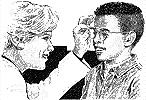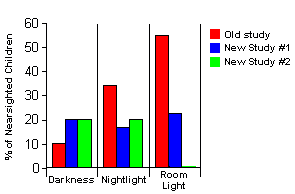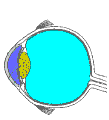 |
Turn the (Night) Lights Back On? |  |
| (Studies suggest that nightlight use by children does not increase the risk of nearsightedness) |
 |
Turn the (Night) Lights Back On? |  |
| (Studies suggest that nightlight use by children does not increase the risk of nearsightedness) |
March 28, 2000 
The PastOn May 28, 1999, a Neuroscience for Kids, In the News page reported on a research study that suggested that children who used nightlights were at a greater risk of becoming nearsighted than those who did not use nightlights. This study showed that only 10% of the children who slept in darkness were nearsighted compared with 34% of the children who slept with a nightlight and 55% of the children who slept with a room light and later developed nearsightedness. |
New DataTwo studies (both published in Nature, March 9, 2000) show that using nightlights may NOT contribute to nearsightedness. In the first study, scientists studied 1,220 children (median age, 10.2 years old). The number of children who were nearsighted was approximately the same in different lighting conditions: 20% of the children (84 of 417 children) who slept in darkness were nearsighted; 16.8% of the children (128 of 758 children) who slept with a nightlight before they were two years old were nearsighted; 22.2% of the children (10 of 45 children) who sleep with the room lights on were nearsighted.The second study examined the incidence of nearsightedness in 213 children (mean age, 10 years old) and their parents. Again, as in the other study, the use of nightlights did not change the probability of becoming nearsighted: 20% of the children who slept with a nightlight before the age of 2 years were nearsighted; 20% of the children who slept in the dark were nearsighted and none of the children who slept with room lights on were nearsighted. Nightlights were used more often when both parents were nearsighted. Also, if both parent were nearsighted, the children were more likely to be nearsighted themselves compared to children with either one nearsighted parent or no nearsighted parents. |  Data from:
|
Why The Difference Between Studies? The studies appear to
contradict the earlier study and suggest that using a nightlight does NOT
contribute to nearsightedness. Rather, these data suggest that
nearsightedness is related to something inherited from parents. Two
reasons may explain the differences between the results of the old and new
research: The studies appear to
contradict the earlier study and suggest that using a nightlight does NOT
contribute to nearsightedness. Rather, these data suggest that
nearsightedness is related to something inherited from parents. Two
reasons may explain the differences between the results of the old and new
research:
So, do nightlights contribute to nearsightedness or not? This research makes the case that heredity plays a strong role in the development of nearsightedness. The older study failed to consider the possibility of a genetic factor. Did parents in the new studies answer questions truthfully? Future research may provide us with more certain answers. |
| References:
|
 Do You Wear Glasses? |
 The Eye |
 The retina |
 Experiments and Activities about Vision |
| BACK TO: | Neuroscience In The News | Table of Contents |
![[email]](./gif/menue.gif) Send E-mail |
 Fill out survey |
 Get Newsletter |
 Search Pages |
 Take Notes |